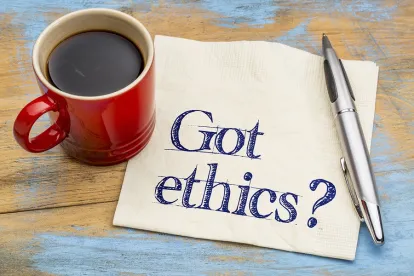The US Supreme Court will hear oral arguments on November 28, 2022, on whether lobbyists should be held to the same ethical standards as public officials.
“When a public official accepts money to convince the government to do something, we call him a crook. But when a private citizen accepts money to convince the government to do something, we call him a lobbyist.” So begins the Supreme Court brief of Petitioner Joseph Percoco, who did not hold elected or appointed government office, but was nonetheless convicted of violating the law of honest-services fraud, which has traditionally only been applied to public officials.
Honest-services fraud is a federal crime defined as a “scheme or artifice to deprive another of the intangible right of honest services.”[1] To violate the law, the victim (i.e., the general public) must have been owed some obligation by the defendant (i.e., the elected official) to govern impartially because an elected official is a “trustee” to the public and therefore owes a fiduciary duty to their constituents. But in Percoco’s case, this fiduciary duty to the public was attached not because he was in a government position, but because he was a successful lobbyist.
K Street, take note: The outcome of this case could mean that if someone is too good of a lobbyist, they may owe the public a fiduciary duty to work in the interest of the general public, and not just in the special interests of their clients.
Such is the ruling by the US Court of Appeals for the Second Circuit, which held that a lobbyist’s payments from their clients could transform into “bribes” if they exercise de facto control over government actions or when elected officials rely on them too much.[2]
That was the theory upon which Joseph Percoco was convicted. He previously worked in former New York Governor Andrew Cuomo’s administration and was the campaign manager for Governor Cuomo’s re-election (and was destined to go back to an official position in Albany if Mr. Cuomo was re-elected). While Percoco was between government jobs, he received an informal government relations contract from a private sector client for help solving a certain regulatory problem. A jury in the Southern District of New York found this all too close for comfort and convicted Percoco on two counts of conspiring to commit honest-services fraud (one of which took place while Percoco was Governor Cuomo’s Executive Deputy Secretary) and one count of soliciting bribes and gratuities. Percoco was sentenced to 72 months of imprisonment and was ultimately forced to forfeit approximately $320,000. The Second Circuit gave legal cover to the lower court’s jury instruction that a private citizen owes the public a fiduciary duty if they exert sufficient control over the government and the government relies on them due to a special relationship.[3]
Percoco argues that the Second Circuit’s holding flips established legal precedent on its head, as it requires that a lobbyist adheres to the same legal duties imposed upon elected officials. Elected officials, to be sure, may not abdicate their decision-making responsibilities to lobbyists and campaign contributors, as they owe the public a duty to execute their office impartially. Indeed, elected officials swear an oath to perform their services to the public with integrity. A lobbyist, however, does not swear such an oath and does not affirmatively agree to act as a trustee for the general public, which is the basis for the theory imposing fiduciary obligations onto elected officials. On the contrary, a lobbyist signs a contract to zealously represent the interests of their client before the government, just as an attorney might.
Percoco also makes a constitutional argument against his conviction. The First Amendment affords citizens a right to petition their government for the redress of grievances (which is a fancy way of saying “lobbying”). According to Percoco, prosecuting citizens for successfully lobbying their elected leaders would be prosecuting citizens for exercising their constitutional rights too well. Moreover, doing so would chill channels of communication between elected officials and their constituents, as private citizens might repress their desire to lobby out of fear of prosecution.[4]
The Back Story
As with many corruption cases originating in New York, the facts can make you cringe a bit. There are several issues here, but the important one involves a classic revolving-door case. From 2011 to 2016, Percoco was Governor Andrew Cuomo’s Executive Deputy Secretary, except for approximately eight months in 2014 when he managed the Governor’s re-election campaign. While serving as campaign manager, the position of Executive Deputy Secretary remained vacant but, according to the government, Percoco continued to enjoy the perquisites of that office. While on campaign leave, Percoco accepted $35,000 in payments routed through his wife in exchange for helping a real estate developer convince a New York state agency to ease some labor requirements. During this period, Percoco made several assurances to his client that he would be able to take care of the developer’s problems by “pressuring” certain persons in government. The pressure campaign was ultimately successful and the state agency dropped its labor requirements before awarding the developer the state contract. The developer credited Percoco’s intervention with the State’s favorable, last-minute decision-making.
But cringe-worthy does not equal unlawful. Only unlawful equals unlawful. And if the facts did not make you cringe, the government’s desire to resurrect United States v. Margiotta might. Margiotta is one of the most criticized cases to come out of the Second Circuit. It is a 1982 case issued over the dissent of the late and widely respected Judge Winter that expanded the rather inchoate, common-law notion of “honest services” fraud by extending it to influential private citizens.[5] The Margiotta court used the same reasoning as the Second Circuit did in Percoco’s case, stating that certain influential private citizens have the same fiduciary duties owed by public servants. Legal scholars and judges have widely condemned the Margiotta decision, and developments in the law since then have left it so discredited that even district courts within the Second Circuit have declared that “Margiotta was wrongly decided and is no longer good law in this Circuit or anyplace.”[6]
The Supreme Court just might agree. Its decisions have never endorsed wildly subjective or expansive interpretations of ethics laws. In the campaign finance context, it has stated that “the Government may not penalize an individual for ‘robustly exercis[ing]’ his First Amendment rights,”[7] including the right to petition public officials through campaign donations that may garner “influence over or access to” elected officials or political parties.[8] In Skilling v. United States, a majority of the Court did uphold a vague anti-fraud provision against a constitutional challenge, but only after limiting its application to “core” and “paramount” circumstances.[9] And in McDonnell v. United States, the Court explained that bribery law is not concerned with influence in the abstract, but rather with the sale of one’s “official position.”[10] To which Percoco says, exactly: I had no official position so that means there can be no bribery. And if there is no bribery, then there is no honest-services fraud.
Expected Arguments
The United States disagrees. It contends that the lack of a formal employment or agency relationship with the government cannot immunize an individual from honest-services liability. It points to several analogous federal statutes that broadly define the duty of honest services as extending not just to persons in government but to “persons authorized to act on behalf of . . . a government.”[11] The government would have the Court extend the notion of “private bribes” to persons who are slated to return to government or who are continuing to use government facilitates while on temporary leave.
So, both Percoco and the United States are going to be arguing over the breadth and scope of Skilling. Percoco will point out that in Skilling, the Court salvaged some congressional attempts to clarify honest services, bribery, and kickback prohibitions by acknowledging that these laws have a proper place in the US Code, but that their applications must be limited to “paramount,” “classic,” “heartland,” or “paradigmatic” cases involving “bribes or kickbacks.”[12] Percoco will point to the completely private-sector relationships he had with his client and that no money was given to any government official. The United States will highlight a particular part of the Skilling opinion, which states “it has always been ‘as plain as pikestaff’ that bribes and kickbacks constitute honest-services fraud” and that the statute’s “mens rea requirement further blunts any [lack of notice] concern.”[13]
The US Chamber of Commerce and Citizens United, both of which may not be the biggest fans of Governor Cuomo’s policies, have nevertheless entered arguments on Percoco’s behalf. The Chamber’s amicus brief states its entire business membership would be on edge if there was no clear line drawing as to when a private citizen lobbies “too much” or is “too good” at it. Instead of exhuming the Margiotta decision and introducing a subjective, ambiguous rule, the Chamber would have the Court or Congress adopt objective, administrable tests.
The brief submitted by Citizens United wasted no time in reminding the Court of one of the hallmark phrases in the Court’s Citizens United opinion: the Court has made clear “[r]eliance on a ‘generic favoritism or influence theory . . . is at odds with standard First Amendment analysis because it is unbounded and susceptible to no limiting principle.’”[14] Crafting a “too influential” standard for extending a fiduciary duty owed to the general citizenry by lobbyists, according to Citizens United, would do just this.
The Good News
In the end, this case is not about run-of-the-mill K Street lobbyists who have previously worked on the Hill or in an administration or those who may someday return to government service in a new administration or for a newly elected member of Congress. So long as lobbyists and their employing offices (both in the private sector and in government) abide by revolving door statutes, cooling off periods, and relevant disclosure provisions, then their work for their clients can proceed as normal. Sure, these Executive Orders, ethics regulations, objective timelines, and lobbying disclosure forms may be annoying, and their efficacy questionable, but most will agree that they are better than the alternative standard the government is seeking to impose here.
It is likely the Court will reaffirm that lobbying has a protected place in our country, as do statutes against bribery and corruption. But it will also likely hold that any bribery statute must be clearly written and applied, and that the law requiring honest services of government officials applies to government officials and government officials only. Critics will say such a ruling is yet another example of the corrupt Washington swamp protecting itself, but this over argues the case.
FOOTNOTES
[1] 18 USC § 1346.
[2] See United States v. Percoco, 13 F.4th 180, 194–95 (2d Cir. 2021).
[3] Id. at 194.
[4] See Brief for Petitioner at 38–42.
[5] United States v. Margiotta, 688 F.2d 108, 138 (2d Cir. 1982) (“[W]e reject a per se rule precluding, as a matter of law, the finding of a fiduciary duty to the citizenry to render honest and faithful services on the part of individuals who technically hold no official public office yet participate substantially in the governance of communities.”).
[6] United States v. Adler, 274 F. Supp. 2d 583, 587 (S.D.N.Y. 2003).
[7] McCutcheon v. FEC, 572 US 185, 205 (2014) (plurality opinion).
[8] Id. at 208.
[9] Skilling v. United States, 561 US 358, 404 (2010).
[10] McDonnell v. United States, 579 US 550, 552 (2016).
[11] Brief for Respondent at 14.
[12] Skilling, 561 US 358, 404, 409–11 & n.43.
[13] Id. at 412. In this context, “pikestaff” means “obvious” and refers to the pole that a peddler would tie to his pack.
[14] Citizens United v. FEC, 558 US 310, 359 (2010) (quoting McConnell v. FEC, 540 US 93, 296 (2003)) (Kennedy, J., concurring in the judgment in part and dissenting in part). In a poetic touch, Citizen United’s brief also declares: Notwithstanding invocations to the contrary, the Second Circuit’s attempt to attach a fiduciary duty to persons who exercise “dominance and control” is an impermissible attempt to regulate influence by another name. Brief for Citizens United at 29 (citing William Shakespeare, Romeo and Juliet act 2, sc. 2 (“What’s in a name? That which we call a rose/By any other word would smell as sweet.”)).




 />i
/>i
